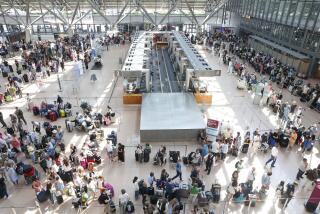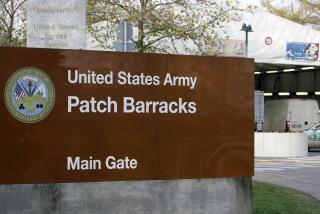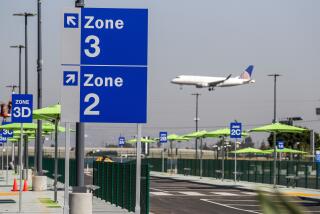State Department Warns of Y2K Concerns Abroad
- Share via
Worldwide
Americans planning to be abroad in late 1999 or early 2000 should be aware of the potential for year-end computer-related problems that may disrupt travel, the State Department advises. In countries that are not adequately prepared, Y2K computer malfunctions could affect financial services, utilities, telecommunications or transportation. By Oct. 1, the State Department’s consular information sheets will contain specific information on Y2K preparations in each country. Meanwhile, a few general areas of concern:
* Some transportation systems abroad may be affected by computer problems.
* Do not assume that credit cards, ATMs, international banking transactions and other functions will operate normally all over the world.
* If you have special medical requirements, do not assume that all medical services will be available.
* Electrical, water and sanitation systems may be affected.
Terrorism alert: U.S. intelligence has determined that Saudi terrorist sponsor Osama bin Laden is in the advanced stages of planning another operation against American interests, although the targets and timing are unknown. A U.S. official, speaking anonymously, said last month that Bin Laden, whom Washington blames for last year’s attacks on U.S. embassies in Kenya and Tanzania, is expected to focus on targets in poorer countries where security is weaker. In what may have been a related move, the State Department closed six of its embassies in Africa for a few days late last month, citing security concerns. The facilities in Gambia, Togo, Madagascar, Liberia, Namibia and Senegal were shut after they were found to be under surveillance by suspicious individuals.
Middle East
Israel: With less than six months remaining until what is expected to be Israel’s busiest-yet tourism year, preparations are moving “very slowly,” the Israeli daily newspaper Haaretz observed two weeks ago. Many of the holy sites to be visited by Year 2000 Christian pilgrims are Palestinian-controlled, but the Palestinian Authority does not have enough hotel rooms, water and electricity supplies or joint emergency services with Israel, the paper said.
Meanwhile, an official of Israel’s Religious Affairs Ministry warned that the Church of the Holy Sepulcher in Jerusalem, an expected focus of Y2K pilgrimages, is a potential firetrap that needs more doorways. He told the Reuters news service that disputes between rival Christian denominations that control the church have prevented authorities from making necessary structural changes.
South America
Argentina: Buenos Aires’ image as one of the world’s safest big cities is being stained by an upsurge in violent crime. A leading pollster has reported that in 1998 roughly one in seven residents of the capital was a crime victim. According to the U.S. Embassy, those statistics jibe with the experience of the embassy staff: In the past 12 months, 16% of the employees have been victimized by street crime.
The city’s murder rate--about five per 100,000--is still one of the lowest in the Americas. But one of the city’s newspapers reported that street crime roughly doubled between 1997 and 1998. In another newspaper report covering one neighborhood near the U.S. Embassy during a one-week period in April, four banks and three pharmacies were held up, thieves shot at the car of a provincial official, the Argentine education minister’s home was robbed and a U.S. congressman was assaulted after parking his car at the zoo.
Briefly . . .
Belgium: Following the convictions of Algerian terrorist members of the Armed Islamic Group, the organization has threatened to conduct attacks in Belgium. The U.S. Embassy in Brussels, in an alert effective until Sept. 15, urges Americans to be careful in public situations and to report any suspicious activities to police. . . . Jamaica: Troops began patrolling the streets of Kingston to help put down a wave of violent crime that took almost three dozen lives in and around the capital in the first half of this month, the prime minister announced. The killings were mostly confined to depressed areas of Kingston and the adjoining St. Catherine community, leaving tourist resorts and the countryside largely untouched. . . . India and Pakistan: At press time, the military conflict near the Indo-Pakistani border appeared to be winding down. But the State Department, in a notice effective until Sept. 17, continues to caution U.S. citizens to avoid travel in Kashmir, particularly near the so-called line of control between Indian- and Pakistani-held territory . . . . Turkey: A bomb planted in a trash can exploded in a crowded Istanbul park popular with picnickers earlier this month, killing one person and wounding more than 20. Turkish officials suspected it was the work of Kurdish separatists reacting to the terrorism conviction and death sentence imposed on Kurdish rebel leader Abdullah Ocalan by a Turkish court. . . . Macedonia: Following the end of hostilities in Serbia, the State Department has canceled its May 28 public announcement warning of the possibility of retaliation against U.S. citizens in the former Yugoslav republic of Macedonia.
Hot spots: State Department travel warnings are posted for Afghanistan, Albania, Algeria, Angola, Bosnia-Herzegovina, Burundi, Central African Republic, Colombia, Congo (formerly Zaire), Eritrea, Ethiopia, Guinea-Bissau, Iran, Iraq, Lebanon, Liberia, Libya, Montserrat, Nigeria, Pakistan, Republic of Congo (Brazzaville), Rwanda, Serbia and Montenegro, Sierra Leone, Somalia, Sudan, Tajikistan and Yemen.
The U.S. State Department offers recorded travel warnings and advisories at (202) 647-5225; the fax line is (202) 647-3000. Internet address is https://travel.state.gov.
More to Read
Sign up for Essential California
The most important California stories and recommendations in your inbox every morning.
You may occasionally receive promotional content from the Los Angeles Times.










